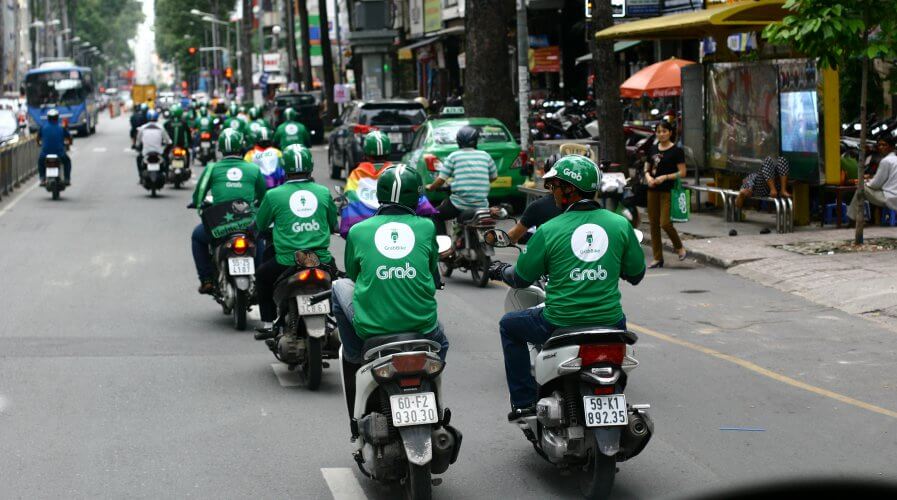
How will the Gojek-Tokopedia merger rival Grab in SEA? Source: AFP
How will the Gojek-Tokopedia merger rival Grab in SEA?
- As merger talks between Gojek and Tokopedia fall through, Grab may have lost out on a golden opportunity to bolster its presence in Indonesia and more so, with a strengthened Gojek
- Gojek is now in a unique position to greatly determine and influence the tech power play in Southeast Asia over the next decade
Indonesia may soon launch a gargantuan ride-hailing, food delivery, and e-commerce entity that will be known as ‘Goto’ – a by-product of a merger between two of the country’s most valuable tech companies, Gojek and Tokopedia. The union of both giants will mainly rival Grab in the region in terms of size and investor interest.
According to a report by Bloomberg, the merger may conclude in the upcoming months and the combined entity plans to be listed in Indonesia itself and the United States. To put the values of the companies in context, Gojek is currently valued at about US$10.5 billion, while Tokopedia is valued at around US$7.5 billion. On the other hand, Grab’s last known valuation was around US$14 billion, hence a combined Gojek-Tokopedia entity would potentially have a higher valuation than Grab.
Talks between Gojek and Tokopedia began shortly after potential merger talks between the former and Grab reportedly hit an impasse when both parties failed to agree on certain issues pertaining to control over the combined Grab-Gojek entity. Reports claim that Grab requested significant voting power in the merged company, and feels that they should own a bigger percentage of the merged company as its finances are more “robust” compared to Gojek.
A report by The Information indicated that the rank of Goto’s top management will be packed with senior leaders from both firms, including Gojek’s co-CEOs Andre Soelistyo and Kevin Aluwi, as well as Tokopedia CEO William Tanuwijaya and president Patrick Cao. GoTo will provide services spanning rides, e-commerce, food delivery, payments, and logistics — the core businesses of the two platforms. In another report, Gojek is said to hold a 60% stake in the joint entity, with Tokopedia controlling the remaining share.
Will it change the game for Grab in Indonesia?
As expected, the proposed marriage between Gojek and Tokopedia has also stirred dissent amongst drivers all over Indonesia, with motorbike driver unions threatening to spark nationwide protests in a wager to protect their livelihoods. To understand the value of the country alone, to begin with, the Indonesia internet battleground is a key to the region alone. Home to over 273 million, the population of the country makes up 35% of the total population of Southeast Asia.
Research by Google, Temasek Holdings, and Bain & Co forecasts that Southeast Asia’s internet economy could swell to US$300 billion (about S$415 billion) by 2025, three times its current annual size. On the back of this growth, Indonesia will be the biggest contributor in the region and the proof is its digital economy that had quintupled to US$44 billion in 2020, after being valued at just US$8 billion in 2015.
That said, a Gojek-Tokopedia entity will play a significant threat to Grab’s dominance in Indonesia. In 2019, Tokopedia was the most visited e-commerce website in Indonesia, before being overtaken by Shopee in 2020. As it is Shopee (which is owned by another regional internet giant Sea) is also aggressively gobbling up Southeast Asia’s digital economy market share. With access to hundreds of millions of potential Tokopedia existing users, Gojek would be in an even stronger position to introduce its service offerings to a wider audience base.
The Gojek-Tokopedia entity will also hold a dominant position in the country’s e-commerce, digital payment, ride-hailing, as well as food delivery business. As Gojek ramps up discussions with Tokopedia, the combined Gojek-Tokopedia entity may introduce a whole new Indonesia powerhouse that may be detrimental to Grab’s ambition in being the region’s dominant super app.
The natural synergies between Gojek and Tokopedia would also allow the technology giants to cross-sell into each other’s respective pools of customers and increase user stickiness. For instance, Tokopedia’s e-commerce business working with Gojek’s last-mile delivery solutions, or Tokopedia’s “buy-now-pay-later” schemes integrated with the services of Go-Pay and Gojek affiliate Bank Jago.
Experts reckon that it is unlikely that Grab will sit back. The union may spur an alliance between Grab-backed digital wallet Ovo and Ant-backed Dana, as rumored in June last year. This could signal a heated competition between Gojek’s GoPay and a Grab-backed Ovo-Dana in an attempt to capture a greater share of the Indonesian e-wallet market, where digital payments are trending. However, Grab would need to take quick action to compete with Gojek’s Go-Pay, which is already a preferred digital wallet amongst locals.
READ MORE
- Data Strategies That Dictate Legacy Overhaul Methods for Established Banks
- Securing Data: A Guide to Navigating Australian Privacy Regulations
- Ethical Threads: Transforming Fashion with Trust and Transparency
- Top 5 Drivers Shaping IT Budgets This Financial Year
- Beyond Connectivity: How Wireless Site Surveys Enhance Tomorrow’s Business Network
